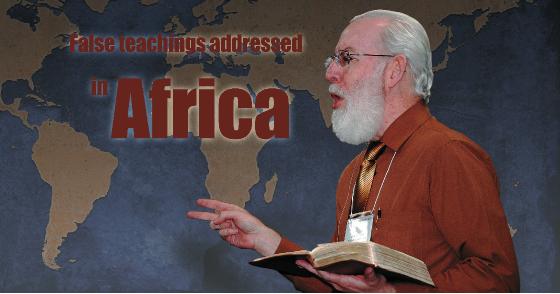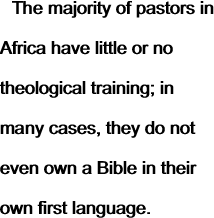 |
|
HOME | PROCLAMATION! MAGAZINE | DEVOTIONALS | STUDIES | LETTERS | ABOUT US | RELATED WEBSITES |
|
HOME / PROCLAMATION! MAGAZINE / 2008 / NOVEMBER/DECEMBER / CARDEN
NOVEMBER/DECEMBER 2008
VOLUME 9, ISSUE 6
A R T I C L E S

Paul Carden
Editor's Note: On September 27, 2008, Paul Carden of the Centers for Apologetics Research (CFAR) introduced the Africa Center for Apologetics Research (ACFAR) at a fundraising dinner held in Santa Ana, California, to help launch the new organization. Paul gave a short speech to open the evening, and we share it below because it vividly shows the international need for Christian apologetics and materials to equip missionaries and church leaders to inform people of the truth and to protect unsuspecting or vulnerable Christians from the ubiquitous lure of false religions and cults. Following his speech, Paul showed a video explaining in greater detail the problems the church faces in Africa, specifically naming Seventh-day Adventism.
Currently, Life Assurance Ministries is working with CFAR to provide both pamphlets and Dale Ratzlaff's books to help local pastors and CFAR missionaries, especially in Africa, to explain Adventism and to help keep people from becoming drawn into it by its deceptive evangelism. We are grateful to be working with Paul Carden and CFAR, combining our efforts to "contend for the faith that was once for all entrusted to all the saints" (Jude 3). Around the world, and especially in the developing world and the post-communist world, dozens—arguably hundreds—of cultic groups are sending tens of thousands of missionaries and spending millions of dollars to empty our churches, to confound the work of the Great Commission and take people captive. In the New Testament we have an apostolic imperative that does not give us the liberty or the luxury to ignore what is taking place on the mission field. Instead, we are commanded to defend the faith once for all delivered unto the saints, to guard the gospel, to protect the Body of Christ, and, at the same time—almost paradoxically—to reach out in love to the people who have been placed in bondage by these groups.
In 1980 I began working for the late Walter Martin—founder of the Christian Research Institute, author of The Kingdom of the Cults. In 1981 he sent me to Africa for three months. What I learned in teaching and speaking in Kenya, Malawi, and Zimbabwe forever changed my life, because I saw firsthand the desperate need for agencies like the Christian Research Institute in the developing world.
Two years later, Walter Martin sent me to Brazil for nine months—which ultimately became six years! I saw firsthand that such an organization can be put together, by the grace of God, outside the United States, and it can make a tremendous change in the dynamic of dealing with cults and false teachings. After establishing such a center in Brazil, in 1993 I facilitated the establishment of the Center for Apologetics Research in St. Petersburg, Russia; later we launched one in Budapest, Hungary, and still later in Kyiv, Ukraine.
But why Africa?
Some of you know the name Philip Jenkins. Some of you realize that the geographic center of Christianity is shifting southward. It is no longer in North America; it is no longer in Western Europe; it is now in places like Africa. In his book The Next Christendom (Oxford, 2002), Jenkins explains that since 1965, when the number of people who identified themselves as Christians in Africa was about a quarter of the population, that number has grown today to nearly half the continent—a fact which is quite astonishing.
Let me go from the macro to what might relatively be the micro—let me talk about Uganda. By the middle of the 21st century there will be more self-described Christians in Uganda than in nations like Germany or Britain. By some estimates, by mid-century Uganda could have more active church members than the four or five largest countries in Europe combined. This is a country the size of Oregon! And this reality is something that we must address.
Why CFAR? Why Africa? Why now?
In 2006 an American missionary invited me to come to Uganda to investigate the possibility of starting a ministry like CFAR. Now, as indicated by what I just told you, the objective facts have been in front of us for years, but we were missing some key ingredients that would make it possible to begin another Center for Apologetics Research in that part of the world. In addition to an extraordinary depth of need in Uganda—a country that has had the bitterest of experiences with cults and false teachings—I found in meeting not only with cult leaders but also with denominational leaders, ministry leaders—Anglicans, Baptists, Pentecostals, Presbyterians, Calvary Chapel—across the board, the nearly unanimous response was: we need this kind of ministry in East Africa now.
Another criterion was met by God's grace. We needed a partner ministry, and God provided the Kampala Evangelical School of Theology: started by Ugandans with the cooperation of John Stott, led by Ugandans, a nondenominational organization that has as one of its fundamental purposes the combating of error, including organized heresies like the cults. This is an extraordinary thing.
And finally: you can have all the other things in place, all the other elements in front of you, but if you do not have someone who is called, someone who is competent, someone who has character to lead the ministry, you will go nowhere. And in John Divito, God has provided the person to start the work of the African Center.
I just want to briefly describe a couple of encounters. One of them was with David Zac Niringiye, who is the assistant bishop of Kampala. [CFAR Africa missionary] John Divito and I met him in his office in All Saints Anglican Cathedral there in the capital. It was very interesting, because we had a very busy schedule, and people were saying, "You have to meet with Bishop Zac!" So we contacted him; his secretary made an appointment for us, and we found ourselves at All Saints, in his office, awaiting his arrival—and marveling, really, at the tremendous collection of books on his walls. This man is at the center of ecclesiastical power in Uganda and seems to lack for nothing. So it was quite remarkable when he entered the room and said, "I hope you know I'm a very busy man. But when they told me the subject was cults, I knew I had to make time for you."
We explained why we were there, and he explained his perception of the situation with cults. Then he told us a story: "One day a young woman, one of my parishioners, came to my office and said, 'What do you know about the Mormons?'" He replied, "They're a cult!" And she said, "My sister's about to marry one." And then she asked, "What can you give me?"
And he looked us right in the eye and said, "I did not have even a tract to put in her hand." This was his illustration of the absurd level of want in Uganda.
I have to make it clear to you: the majority of pastors in Africa have little or no theological training; in many cases, they do not even own a Bible in their own first language. And if they have a problem with a cult, with an aberrant Christian group, with a false teaching that's sweeping in either from the United States or springing up from their own soil, there's no agency to which they can turn today for information and counsel.
The other encounter I would describe to you is this: after John spoke at the Wednesday night service at Calvary Chapel Kampala, we went to our literature table. Young men and women swarmed that table to get information on the Mormons and Jehovah's Witnesses in both English and Swahili. And I will not forget the young man who came up to me with tears, pleading, "Please, start this Center as soon as you can."
To hear and see African Christian leaders describe the toll that cults and false teachings are taking on the Body of Christ and on the work of the Great Commission is a life-changing experience. It is our prayer that we will do all we can, by God's grace, to change that equation and equip the Body of Christ to resist the deception of false gospels. †
![]()
Copyright 2008 Life Assurance Ministries, Inc., Glendale, Arizona, USA. All rights reserved. Revised January 22, 2009. Contact email: proclamation@gmail.com
Paul Carden is the executive director of the Centers for Apologetics Research (CFAR) and has devoted nearly 30 years of his life to cult-related research and outreach. He joined the Christian Research Institute (CRI) in 1980 under its founder, Walter Martin, and worked for CRI for 15 years. For six of those years he served as a missionary in Brazil, and for six years he co-hosted the live, nationwide "Bible Answer Man" broadcast. Paul is also a general editor for Rose Publishing. He and his wife, Lisa, live in Orange County, California, and have four children.
